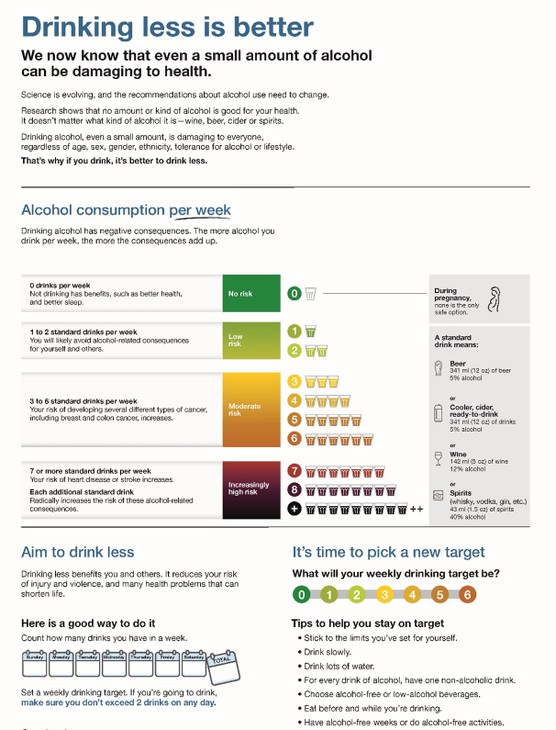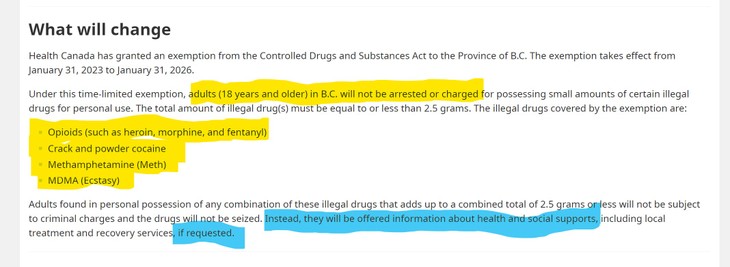There’s a big push on by the nanny state, semi-fascist Canadian government with pretty boy Justin Trudeau at the helm. As if brutally and ruthlessly crushing freedom of speech last year wasn’t enough, bulldozing civil rights into the snow during the trucker revolt, now his holier-than-thou group of nursemaids is suggesting restricting one of the few pleasures left to Canadians: imbibing the adult beverages of their choice.
Justin Trudeau’s government has introduced some of the strictest guidelines on alcohol consumption in the West, just weeks before Canada will decriminalise heroin and crack cocaine in parts of the country.
The government is recommending Canadians have no more than two drinks per week. The new advice is a steep drop from the previous recommendation of a maximum of 10 drinks a week for women and 15 drinks for men.
No amount of alcohol is safe, says Canadian Centre on Substance Use and Addictions (CCSA) in a report published in January. The report concludes “drinking less is better”, and if you must drink, two drinks maximum each week is deemed low-risk.
Lemme repeat that: NO AMOUNT OF ALCOHOL IS SAFE says the Canadian government. They spent a couple of years working on this report, which is a depressing piece of business if I do say so myself. One of the charts contained…

…lists all the possibilities inherent in a glass or two or three over the threshold they’ve established as an acceptable risk level. They also interviewed and did surveys.
…The update is expected Tuesday after two years of research, a review of nearly 6,000 peer-reviewed studies and about 1,000 survey submissions from the public. Part of the project was funded by Health Canada.
The research includes the impact of alcohol in areas such as women’s health and the association between alcohol use, aggression and violence, the CCSA said. It’s aiming to launch an online advertising campaign by February to raise awareness.
Richardson believes a potential dramatic shift in the guideline is in line with what she’s heard from people in their 20s and 30s about the importance of their mental health and that excessive drinking is “not really that cool.”
“They know that drinking makes mental health and anxiety worse. They’re seeing it,” said Richardson, a data analyst for a shipbuilding company.
Nowhere is any mention made of any positive association with alcohol and nary is a health benefit to be found in moderate consumption of certain products, like red wine or beer. It’s all one continuous risk factor and cancer causer-palooza.
Which is weird, because I can find all sorts of good news about alcohol. For instance, the Mayo Clinic staff won’t discourage red wine drinkers from a glass with dinner.
Red wine, in moderation, has long been thought of as heart healthy. The alcohol and certain substances in red wine called antioxidants may help prevent coronary artery disease, the condition that leads to heart attacks.
Any links between red wine and fewer heart attacks aren’t completely understood. But part of the benefit might be that antioxidants in red wine may increase levels of high-density lipoprotein (HDL) cholesterol (the “good” cholesterol) and protect against cholesterol buildup.
Health care providers don’t recommend that you start drinking alcohol for heart benefits, especially if you have a family history of alcohol use disorder. Too much alcohol can have many harmful effects on the body.
But if you already enjoy a glass of red wine with your evening meal, drinking it in moderation may improve your heart health.
Even the stuffed shirts at Harvard says it might not be what you drink, but how and when. Moderation is key. What a surprise.
…Despite the healthful compounds identified in red wine, epidemiological studies have not confirmed that a specific type of alcoholic drink, whether wine, beer, or spirits, reduces the risk of cardiovascular disease. Studies that observe populations of people suggest that light to moderate amounts of all alcoholic drinks are linked to reduced diabetes and cardiovascular risk when consumed in equal quantities. This seems to suggest that the alcohol itself, not the specific compounds found in each type of alcohol, has a much greater impact on health benefits.
A report from the Health Professionals Follow-up Study examined the drinking habits of more than 38,000 men over a 12-year period. Moderate drinkers were 30-35% less likely to have had a heart attack than non-drinkers. This reduction was observed among men who drank wine, beer, or spirits, and was similar for those who drank with meals and those who drank outside of meal time. This study also found that the frequency of drinking may matter: Men who drank light to moderate amounts three or more days per week had a lower risk of heart attack than those who drank once or twice a week.
A review of alcohol consumption in women from the Nurses’ Health Study I and II found the lowest death rates from any cause in women who drank smaller amounts of alcohol (about 1 drink per day) over four or more days rather than the same amount of alcohol taken in one or two days. The review also found that all types of alcohol were associated with decreased cardiovascular disease risk, while all types were associated with an increased breast cancer risk.
Surely the Canadian study had access to the same material? I’m guessing they had what’s known as an “agenda” going in. Canadians are wondering about it, as well. It looks like fuzzy math professors have been at it again.
…Although reports have suggested that the guidelines are based on nearly 6,000 peer-reviewed studies, strict criteria ruled all but 16 systematic studies out from being used in the mathematical modelling. In other words, the CCSA is basing its recommendations on a relatively narrow understanding of how alcohol functions.
He points out that the study made no deeper investigation into the development of the cancers themselves. Was it the alcohol that caused the lung cancer, or was it drinking in smoky bars? And just how much cancer are they talking about, to begin with? There’s zero perspectives provided for the scary end results implied.
…According to its data, consuming three and a half drinks a day increases your risk of developing larynx cancer by nearly 100 per cent, which sounds shocking, and is presented in a table with scary red shading. But larynx cancer, which is mostly related to smoking, was diagnosed in roughly 0.0197 per cent of Canadians in 2022. Many of the other cancers the CCSA associates with alcohol also have low incidence rates…
Not so much “massaging” the data as “messaging” it. Make sure the data you include when you publish represents what you want as an end result.
…We should also consider researcher perspective. The CCSA is focused on harm-first, which is less a criticism than a fact: Although its name emphasizes “substance use and addiction,” its focus is on the negative side of “use.” Its job is to look for harm in the name of health. Through this lens, potential benefits don’t track.
And indeed, the CCSA made its recommendations without consideration of the potential (and well-documented) positive effects of alcohol on the lives of individuals, nor the potential harms caused by excessive and patronizing recommendations in the name of “for your own good” science.
Public health. What a trip. What colossal hypocrites. What happens on January 31st in certain Canadian provinces is also driven by public health Experts™. In fact, it’s driven by an entity called Healthy Canada. This is British Columbia’s “exemption.”

You read that right. Get caught with up to 2.5 grams of opioids (such as heroin, morphine, and fentanyl), crack and powder cocaine, methamphetamine (Meth) or MDMA (Ecstasy), and you’re good to go. They will offer you counseling and resources if you ask, though.
Why does one get to do hardcore drugs freely? Reply the Experts™: because it will “help save lives.”
If we treat addiction as a health issue rather than a criminal issue, we have a better chance of helping people who use drugs to seek treatment and improve their overall health. These types of decriminalization policies, which have been successfully employed around the world, also help reduce the stigma associated with drug use and promote dialogue among friends and family about an issue that’s often hidden or ignored.
Cool, huh?
A kinder, gentler way to die an addict. NO DRINK IS SAFE but 2.5 grams of all of the above are fine.
You’re free to go.
Almost makes you wonder if they are trying to get you to give up drinking for a nefarious reason. Like building a population that was easier to control and culled itself.
Nah.








Join the conversation as a VIP Member